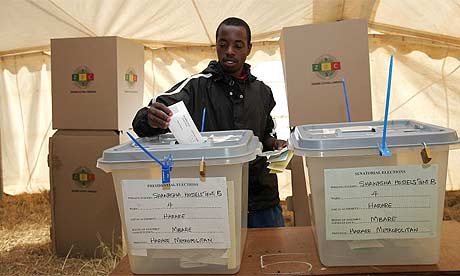
IN almost all countries, voters must be registered in order to be eligible to participate in an election.
Voter registration is intended to ensure that everyone entitled to vote can do so, to prevent ineligible persons from voting, and to guard against multiple voting by the same individual. This process is recognised and acknowledged as important in the Sadc Principles Governing the Conduct of Democratic Elections as well as in the African Union Guidelines on Elections.
It is against this framework that the Zimbabwe Election Support Network (Zesn) considers the ongoing mobile voter registration as an important process in the electoral processes of Zimbabwe.
The previous process was widely condemned by Civil Society Organisation (CSO)s including Zesn and even the Zimbabwe Election Commission (ZEC) chairperson Justice Rita Makarau.
Zesn notes that this time ZEC has made efforts to publicise the process and engage various stakeholders to find ways of mitigating the previous challenges.
Zesn sent teams in all the provinces to observe this important process, to ensure processes allow for free participation, to increase citizens’ confidence in the process and detect any challenges and problems in order to proffer recommendations.
Our preliminary findings show varying levels of interests with some centres facing more numbers than can be managed in three days allocated.
This means some centres will fail to register the numbers of people wishing to do so within the three days allocated to a particular centre.
- Chamisa under fire over US$120K donation
- Mavhunga puts DeMbare into Chibuku quarterfinals
- Pension funds bet on Cabora Bassa oilfields
- Councils defy govt fire tender directive
Keep Reading
For example, in Zvimba South at Trelawney Training Centre, on the second day Zesn observed an estimate of 500 people who were in the queue seeking various documentation including registering to vote.
In Mutoko District, Zesn teams visited Chisambiro, Chidye, Kamwazva and Ushamba Primary School where long queues were also observed.
The teams reported that the process was very slow and noted that most of the youths wanted to be issued with birth certificates and identity cards before they could register.
Women with babies were seen attempting to take birth certificates for their children.
Long queues were also observed at Huruyadzo shopping centre in St Marys (Chitungwiza) and Mai Musodzi Hall in Mbare, Harare, potential registrants continued to lament the slowness of the pace at which people were being processed in these centres.
There was a problem between the allocations of the ZEC personnel to the potential registration such as Cranborne with 10 personnel yet the demand was not as high as areas stated above.
Zesn urges ZEC to deploy more personnel in high-density areas and certain rural areas with higher population.
Most of the people who spoke to Zesn stated that the process was very frustrating, with some claiming that they had been standing in the queue for more than seven hours.
Some also said they had travelled long distances to come to the centre.
With regards to the issue of “aliens”, Zesn noted that potential registrants were referred back to the Registrar General’s Office in their districts in order for them to address certain issues such as long birth certificates with no ID numbers and in some instances they were asked to surrender their original ID cards and rejoin the queue to get new IDs, then wait to collect new ones and then rejoin a queue to register to vote. Zesn notes with concern that the process so far is not fully decentralised to allow them to deal with all enquiries.
In other areas short queues were observed, for example in Bubi at Lortandale Primary. At Mpopoma Community Hall in Bulawayo, Zesn also received reports of some people who voted in the 2008 elections, but could not find their names on the voters’ roll. These people were allowed to register again.
Zesn teams saw isolated flyers and posters in the various wards they visited. This could be attributed to the ZEC’s two voter educators who were deployed in each ward to mobilise and educate the communities.
The teams also noted that some of the voter educators were assisting potential voters to register at some of the centres.
Zesn urges ZEC to find ways of expediting the processing of aspiring registrants. In addition ZEC also find ways of ensuring quick resolution on challenges by people labelled “aliens” so that they are not disenfranchised. We also urge ZEC to seriously note and consider other concerns that are being raised by various CSOs and other stakeholders and ensure that the process is credible.
Zesn remains committed to credible elections and to observing all the electoral processes leading to the 2013 harmonised elections in a non-partisan manner. — Zesn










